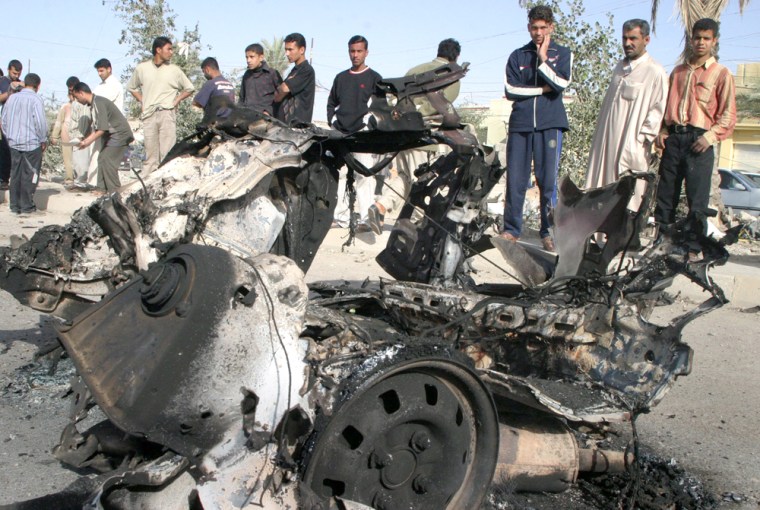American and Iraqi troops swept the oil-rich region of Kirkuk for suspected insurgents and captured dozens, while drive-by shootings, roadside bombings and sectarian violence killed at least 29 people in Iraq on Friday.
A bombing outside a Sunni Muslim mosque after Friday prayers killed five worshippers and wounded 15 people in the city of Khalis, northeast of Baghdad, the army said.
Gunmen in vehicles killed three policemen in west Baghdad and three power station workers headed to their jobs in Taji, just north of the capital, police said.
In southern Baghdad’s Saydiyah district, gunmen killed four pastry shop employees, police said. Nearby, a roadside bomb killed a policeman.
Sectarian violence now common
Retaliatory killings between Shiite and Sunni Muslims have become increasingly common in the capital since the Feb. 22 bombing of an important Shiite shrine that unleashed the continuing rash of sectarian murders. Police said they found 13 bodies, blindfolded and shot, on Friday in the Binok, Kazimiyah and Sadr City neighborhoods.
Mortar rounds fell on homes in south Baghdad and the northern city of Tal Afar, wounding about 10 people, mainly children.
Meanwhile, soldiers of the 1st Brigade Combat Team, 101st Airborne Division joined Iraqi troops in a sweep of five villages outside the city of Kirkuk, 180 miles north of Baghdad. Forty suspected insurgents were picked up in Hawija, police said.
A day earlier, a U.S. military spokesman asserted that major violence is largely confined to just three of Iraq’s 18 provinces, where fighting raged on Thursday with at least 58 people killed in execution-style slayings, bombings and gunbattles.
Sunni insurgents hit a major police and jail facility for a third straight day Thursday — this time with a suicide car bombing that killed 25 in central Baghdad. The attacker struck outside the Interior Ministry Major Crimes unit, killing 10 civilians and 15 policemen, authorities said.
As insurgent forces raised the stakes with the attacks, the U.S. military said late Thursday it was in the second day of an operation with Iraqi soldiers “to disrupt anti-Iraqi forces and to find and destroy terrorist caches in the Abu Ghraib area west of Baghdad.”
The military statement said 1,400 personnel were involved in the operation — termed Northern Lights — and had captured “two persons of high-value interest and 16 suspected terrorists.” Two large weapons caches also were discovered, the military said.
Abu Ghraib, also the site of the infamous prison, is where U.S. and British forces stormed a house Thursday and freed three Christian peace activists held hostage since Nov. 26.
U.S.: Carnage concentrated in 3 provinces
In a rundown of recent military activity, Maj. Gen. Rick Lynch, the U.S. military spokesman, said most violence was focused in three central provinces, including Baghdad.
“There is not widespread violence across Iraq. There is not. Seventy-five percent of the attacks still take place in Baghdad, al-Anbar or Salaheddin (provinces). And in the other 15 provinces, they all averaged less than six attacks a day, and 12 of those provinces averaged less than two attacks a day.”
He said attacks nationwide were averaging 75 a day, a level that has been generally sustained since August.
The three provinces he cited, however, are home to about 9 million people, according to the Iraqi Ministry of Planning and Development — a third of the country’s population of 27 million.
Lynch’s list omitted Diyala province, which stretches north and east of Baghdad to the Iranian border and is home to nearly 1.5 million people. It was the scene Tuesday of the first of the series of attacks on police facilities, when 100 insurgents stormed a jail and freed 33 prisoners, 18 of them their own men captured two days earlier.
That attack killed 20 police and wrecked the jail, police station and courthouse in Muqdadiyah, 60 miles northeast of Baghdad. Ten insurgents were killed.
As Iraqi soldiers and police have begun patrolling more territory, U.S. forces have become less visible in many areas and less easy to target. Also, the nature of the violence has shifted from assaults on American troops to battles rooted in sectarian conflict between Sunni and Shiite Muslims.
More than 1,000 people have died violently in Iraq, mainly in and around Baghdad, since the shrine bombing in Samarra, a city north of Baghdad in Salaheddin province.
The sectarian-rooted deaths have been running at dozens a day. The bodies of hundreds of victims have been dumped after being shot execution-style, hands bound and bearing signs of torture.
Lynch acknowledged a spike in “ethnic-sectarian incidents,” saying there were 75 percent more civilian casualties from March 11-17 than in the previous week. In Baghdad alone, he said, the U.S. command recorded 58 incidents involving 134 dead in that period.
